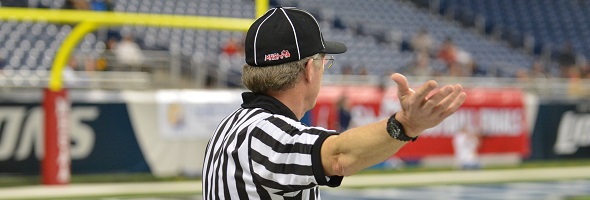
Be the Referee: Pass Interference
September 9, 2014
This week, MHSAA assistant director Mark Uyl explains one of the toughest calls to make on the football field.
"Be the Referee" is designed to help educate people on the rules of different sports, to help them better understand the art of officiating and to recruit officials. The segment can be heard on Mondays, Wednesdays and Fridays during the school year on The Drive With Jack Ebling on WVFN-AM, East Lansing.
Below is this week's segment - Pass Interference - Listen
Today we’re going to talk about one of the most difficult calls for any football official – pass interference. It’s important to know that whenever a forward pass is thrown beyond the line of scrimmage that both players – the offensive receiver as well as the defender – each have an equal right to make a play on the football.
Now, not all contact will automatically result in a pass interference foul. The official must judge if that early contact before the ball arrives has placed one of the two players at a distinct disadvantage. When that contact does create the disadvantage, you have a foul for pass interference. When the contact is minimal and is simply incidental, no foul has occurred.
Past editions
Aug. 25 - Targeting - Listen
Sept. 4 - Concussions - Listen

Be the Referee: 40-Second Play Clock
August 30, 2018
In this week's edition, assistant director Brent Rice explains how Michigan is continuing to experiment with a 40-second play clock in football.
Be The Referee is a series of short messages designed to help educate people on the rules of different sports, to help them better understand the art of officiating, and to recruit officials.
Below is this week's segment – 40-Second Play Clock - Listen
There’s an experiment taking place on a number of high school football fields across the state again this year. Michigan is experimenting with a 40-second play clock in football.
This is designed to provide more consistency from play to play as the ball must be snapped 40 seconds after the end of the previous play and is not dependent on the referee’s subjective signal.
When play is continuing without a stoppage, the 40-second play clock will be used. If play has been stopped for a time out or penalty, the play clock will be set at 25 seconds.
After two seasons, the feedback received from coaches and officials has been very positive, and there’s a possibility the Michigan experiment may become a new national playing rule soon.
Past editions
August 23: Football Rules Changes - Listen

